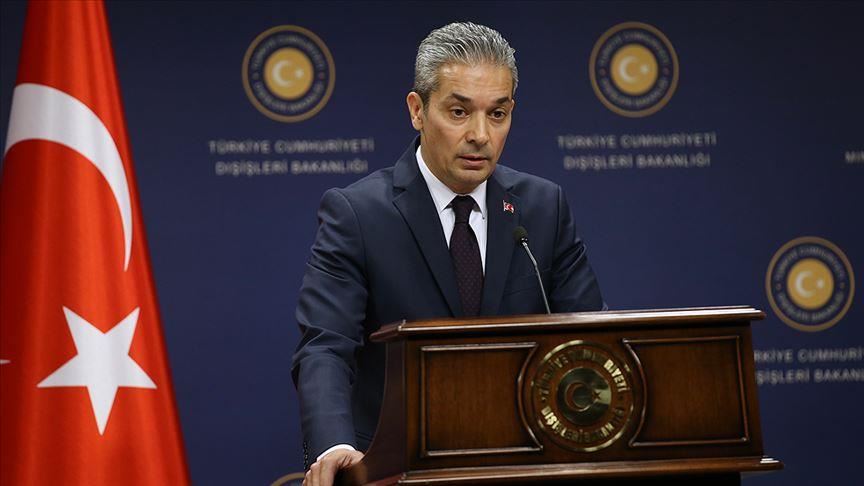'Turkey can make Syria safe zone without US agreement'
Issues of safe zone to be discussed with US military delegation visiting Turkey next Monday

ANKARA
If efforts to find common ground with the U.S. prove unsuccessful, Turkey will have to create a safe zone in Syria on its own, said Turkey’s Foreign Ministry on Friday.
Talks on the issue will continue with a U.S. military delegation due in Turkey next Monday, ministry spokesman Hami Aksoy told a press conference.
On the issue, Turkey expects the creation of a 32-kilometer (20-mile) safe zone in northern Syria, giving Turkey control of this region, which must be cleared of the terrorist groups PYD/YPG, Syrian branches of the PKK, he said.
All aspects of the safe zone and the Syrian conflict have been discussed during recent visits to Turkey by James Jeffrey, the U.S. envoy for the anti-Daesh coalition, Aksoy added.
But Aksoy warned that Turkey’s patience is limited.
“We won’t let this process be dragged out. If our expectations aren’t met, we are fully capable of taking whatever measures [are needed] to ensure our national security.”
He stressed that Turkey wants to clear the area of all terror elements and establish a “peace corridor.”
In July, Jeffrey and Turkey’s National Defense Minister Hulusi Akar met in the capital Ankara and agreed on the establishment of a safe zone in northern Syria.
But on Thursday Jeffrey told reporters in Washington that differences with Turkey over how the zone would operate, as well as its size, are delaying the zone’s implementation.
Clearing terror groups from safe zone
In recent years Turkey and Washington have clashed over the terrorist PYD/YPG, branches of the terrorist PKK.
The U.S. has supported these groups in the fight against Daesh, while Turkey argues that using one terror group to fight another makes no sense.
Those groups must be cleared out of any Syria safe zone, Turkey insists.
In its more than 30-year terror campaign against Turkey, the PKK -- listed as a terrorist organization by Turkey, the U.S. and the EU -- has been responsible for the deaths of some 40,000 people, including women, children and infants.
Syria has been locked in a vicious civil war since early 2011, when the Bashar al-Assad regime cracked down on pro-democracy protests with unexpected ferocity.
Since then, hundreds of thousands of people have been killed and more than 10 million others displaced, according to UN officials.
Idlib de-escalation zone
Stating that protecting the status of the Idlib de-escalation zone carries great importance for Ankara, Aksoy also reiterated Turkey’s commitment to the Sochi agreement which was signed with Russia last September.
He also decried the intensification of the Bashar al-Assad regime attacks in the region since May, saying: “As a result of these attacks, hundreds of people have lost their lives, and thousands have been displaced.
“The attacks risk a refugee wave hitting our country.”
Aksoy also condemned Assad regime bombardment of residential areas on the pretext of fighting terrorism, citing a July 22 attack on a bazaar area which killed at least 50 civilians.
“We convey our concern and expectations on this issue to the regime’s guarantor Russia at every opportunity,” he added.
As the international community fails to raise its voice against these attacks, they will continue, he said.
Aksoy said Idlib was the main topic of the 13th round of Syria peace talks in Astana format that kicked off on Thursday in the Kazakh capital Nur-Sultan.
“To continue the political process, the regime has to end its aggression in Idlib,” Aksoy said, adding that efforts to establish a constitutional committee in Syria have gained momentum.
INF treaty terminated
Touching on the termination of the Intermediate-Range Nuclear Forces Treaty (INF), Aksoy said this situation is troubling for the security of the Euro-Atlantic region, including Turkey.
Turkey does not want a new arms race to start in Europe with the end of this agreement, he underlined.
Since the U.S. and Russia signed it in 1987, the INF treaty has been widely seen as a cornerstone of European security in the post-Cold War era. It prohibits both countries from possessing and testing ground launch missiles with a range of 300-3,100 miles.
Russia on Friday announced the termination of the landmark treaty.
Meanwhile, Turkish Foreign Minister Mevlut Cavusoglu is being decorated with an order of merit by the emperor of Japan for his efforts to strengthen Turkish-Japanese relations, Aksoy said.
The award will be presented to Cavusoglu on Aug. 8 at the Presidential Complex in Ankara, he added.
*Writing by Faruk Zorlu and Sena Guler








